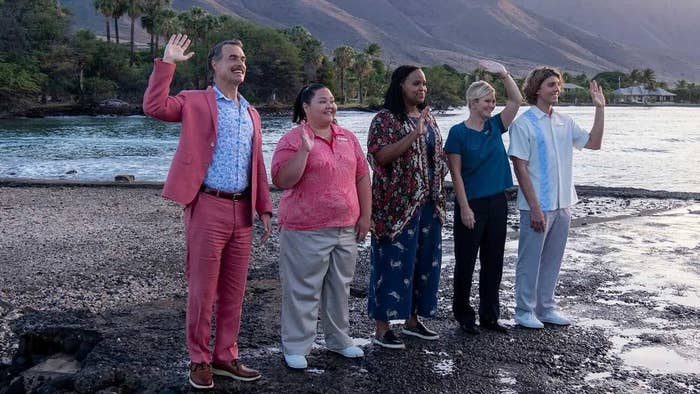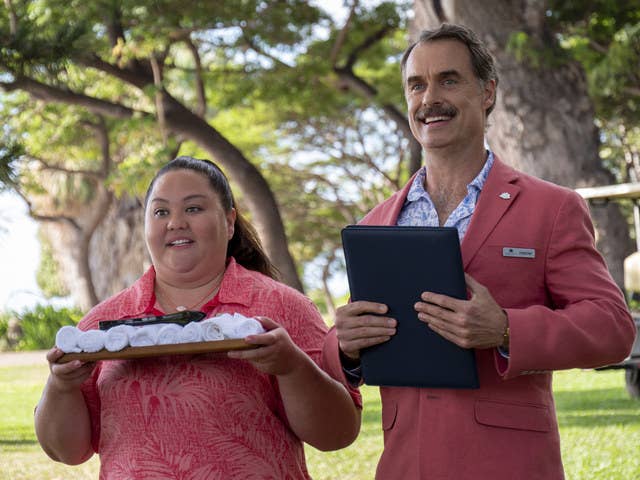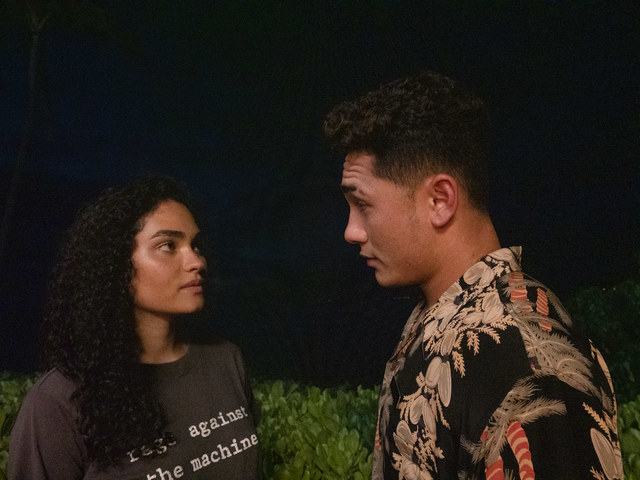
Over the past few years, like so many concepts on the internet, the idea of “emotional labor” has been applied so liberally that it’s nearly lost all meaning. A mega-viral 2017 essay turned book by Gemma Hartley used the term to condemn the inequity of women’s unpaid work in their straight relationships, which has since given anyone annoyed at their boyfriend an academic theory to score points with during fights over chores. Even though sociologist Arlie Hochschild has made clear that “emotional labor,” as she originally conceived it in the ’80s, refers to the effort of managing one’s emotions on the job — not housework — that pernicious concept creep into the domestic sphere persists.
For a razor-sharp exploration of true emotional labor’s perils in the modern age, you’d be hard-pressed to find better than Mike White’s dazzling HBO tragicomedy The White Lotus, which — sadly for all of us who have been living for Sunday nights recently — just drew to its (somewhat anticlimactic) conclusion.
In the show, a classic upstairs-downstairs dynamic plays out over an increasingly absurd week at a Hawaiian resort, where hotel staffers are instructed to treat each guest like a “special chosen baby child.” That directive comes from the handsomely mustachioed general manager, Armond (Murray Bartlett), who in the first episode advises staffers to disappear behind masks and become “pleasant, interchangeable helpers” in the process. “It’s like tropical Kabuki!” he says.
Armond and his crew are charged with the daunting task of keeping a bunch of wealthy sourpusses happy on their luxury vacation. For the warm and lovely Belinda (Natasha Rothwell), who runs the resort spa, that means catering to Jennifer Coolidge’s Tanya McQuoid, a grieving, wayward soul toting her recently deceased mother’s ashes around in a plastic bag. Tanya has a transformational experience during her first session with Belinda. For the rest of the week, Tanya pesters her into multiple off-the-clock meetups during which the poor Belinda must remain open, kind, and accommodating to Tanya’s bottomless well of need. It’s only when Tanya teases the possibility of funding Belinda’s own spa that she dares hope she might be compensated for her labor after all.
Across the hotel, Armond has to deal with Shane Patton (Jake Lacy), a honeymooner and real estate heir who’s pissed to have been put in the wrong room when his mother specifically paid for the suite with a plunge pool. Shane and Armond generate the show’s central tension: Shane, a spoiled man-child with a chip on his shoulder because of those who resent his wealth and access (“People have been coming for me my whole life”), essentially drives someone who’s five years sober to relapse. Armond, crashing off the wagon, grows increasingly dangerous to himself and to others, first trading better shifts for sexual favors from his staffer Dillon (Lukas Gage) just because he can, completely giving himself over to nihilism and destruction. “They exploit me,” Armond tells a zonked-out Dillon while he cuts a few more lines. “I exploit you.”
In retrospect, it wouldn’t have made much sense for anyone but Armond to meet their demise.

The White Lotus is the latest in a string of prestigey HBO murder mysteries — Big Little Lies, The Undoing, Mare of Easttown — to tug viewers along in eager anticipation of whodunnit. In White Lotus’s case, we’re also questioning who actually dies. When we learn in the first episode that someone’s been killed at the resort, all we know is that the victim can’t be the show’s number one worst character, Shane, since he’s the one who breaks the news about the body. But I think a lot of us still held onto hope that one of the other terrible rich people would eat it in the end.
Why not Mark Mossbacher (Steve Zahn), beta cuck to his Sheryl Sandberg–esque tech titan wife, Nicole (Connie Britton)? Reeling from the revelation that his dad had sex with men and died of AIDS, Mark spends his vacation struggling to assert his masculinity, trying and failing to bond with his awkward teenage son Quinn (Fred Hechinger). It’s only when he unsuccessfully tries to prevent a robbery that he’d inadvertently set into motion, and consequently gets beaten up while attempting to protect his wife, that Mark feels resplendently restored to his manhood.
During one of his masculinity spirals, Mark had confessed to his son the obscene amount he spent on a set of bracelets for his wife, trying to make it up to her after an affair, which inspires Paula (Brittany O’Grady), a college friend of Mark’s daughter Olivia (Sydney Sweeney), to attempt a poorly planned bit of Robin Hooding. Paula is the closest proxy we have for the viewer: a nonwhite, presumably less rich interloper in this world of wealth and artifice who’s disgusted to see her Native Hawaiian hookup, Kai (Kekoa Scott Kekumano), a staffer at the resort, performing his culture for colonizers. She encourages him to steal the bracelets. Kai escapes from the Massbachers in their suite, but, as we learn from Armond, he's caught in the end — never to be seen again.
But of course the dead character couldn’t be Mark. This is not a show about how workers and Native Hawaiians rise up against their oppressors; this is a show about the insidious power of wealth and whiteness, which demands — even requires — the emotional labor of the underclass to perpetuate itself. The less willing Armond becomes to soothe Shane’s fragile little ego, thus abandoning the status quo of who serves and who is served, the more he threatens to shatter the guest’s worldview that he “can’t help” the privileges into which he was born, but he nevertheless belongs in society’s upper echelons. This is power to which he is entitled, and how dare anyone begrudge him that? Shane expects his new wife, Rachel (Alexandra Daddario), a hustling freelance writer of trashy clickbait, to immediately adjust to that sense of thoughtless entitlement he’s enjoyed all his life. Why, now that she no longer has to do shitty work for money, would she bother anymore? And why doesn’t she share his anger that this hotel manager isn’t treating them like the real estate royalty they are?
Once Armond comes fully undone, he indulges in a fleeting victory by taking a dump in Shane’s suitcase; Shane responds by stabbing him in the stomach and leaving him to die. That Armond’s death feels somewhat inevitable doesn’t make it satisfyingly so — especially because the show chooses to skip over the immediate aftermath, during which we can imagine Shane evades responsibility in any number of rich-white-guy ways. It also feels inevitable, yet similarly unsatisfying, that Rachel, after nearly exploding their relationship, accepts her Faustian bargain and meets Shane at the airport after all. She vows, as Shane’s honeymoon-crashing mother, Kitty (Molly Shannon), instructs her in one of the show’s best and funniest scenes to simply choose to be happy. Does Rachel not suspect that her husband used the knife he’d kept at their bedside to kill the guy he’s had a vendetta against all week? Does she know and just not care? We might crave a few more beats with Rachel, but she is ultimately — tellingly — subsumed into Shane’s point of view.
There’s only one aspect of the finale that carries with it any sense of joy or triumph. Quinn, who loses all his devices to the tides early in the season, has learned to love the ocean he sleeps beside every night since his sister banished him from their hotel suite. Sunrise whale watching gives way to impromptu trips on an outrigger canoe with Native Hawaiians. He begins to have a very different experience than that of the rest of his family, who nitpick each other about their ideological discrepancies. Nicole is a Clintonite liberal, given plenty of grief by her woke zoomer daughter — whose performative progressivism is eventually put to the test — while Mark thinks everyone’s a primate following their base instincts, duking it out in a dog-eat-dog world.

Quinn isn’t here for any of it. “We all do the same shit,” he says at one point, fed up with the latest squabbling. “We’re all still parasites on the Earth. There’s no virtuous person when we’re all eating the last fish and throwing all our plastic crap in the ocean.” I cheered in one of the show’s final moments when, on the verge of boarding the plane home with his family, Quinn rejects the path laid out before him and absconds back to the beach. Heartwarming as his breakout might be, though, this isn’t a happy ending for anyone but Quinn; here’s yet another white person with a safety net on a getaway in Hawaii, where native citizens are forced to labor on their own stolen land.
Those Quinn leaves behind, meanwhile, try as they might to escape from their parents’ shadows, are doomed nonetheless to their inheritance. As Paula tells Olivia: Rebel against them or not, these people are still your tribe.
And so a 16-year-old white boy gets to row a canoe with his new pals, and perhaps stand a chance at growing up to be less miserable than his parents. Meanwhile, a young Hawaiian whose life has been forever changed by his run-in with this horrible family is presumably sitting in prison. Lani (Jolene Purdy), a hotel trainee who gives birth on the job in Episode 1, has also disappeared without a trace. White Lotus ultimately (and disconcertingly) treats the native population as window dressing. Critic Lorraine Ali at the Los Angeles Times wrote in her review of the show that it’s “so focused on the selfish usurpers and every absurd detail of their horribleness that it too ignores ‘the help’ until they’re needed to juice up the plot.” The drama is driven by the exploitation and suppression of people of color, and yet we never spend much (if any) time immersed in their point of view.
But maybe White Lotus is attempting to implicate the viewer — who’s turned on yet another show about rich white assholes vying for power — in these characters’ subjugation. As my former colleague Alison Willmore wrote in 2019 about another beloved horror-comedy devoted to the lives of bad billionaires: “The world they live in is meant to be ours, and they rule over it not because they're evil geniuses but because we let them.”
That’s why White Lotus gets so uncomfortable, sometimes even painful to watch, especially due to Cristobal Tapia de Veer’s extraordinary, anxiety-inducing score. White characters wax lyrical about social justice with cocktails in hand, forever preoccupied with their own tiresome self-mythologizing; brown workers are paid pennies to attend to their every need while actively rejecting and suppressing their own. “Welcome to history,” Mark tells his daughter, whose complaints about imperialism aren’t loud enough for her to pull a Quinn or to align herself more firmly with Paula than with her family, her tribe. “Welcome to America.” ●
